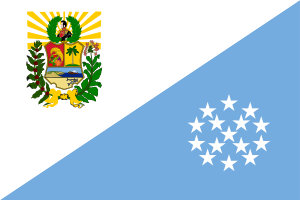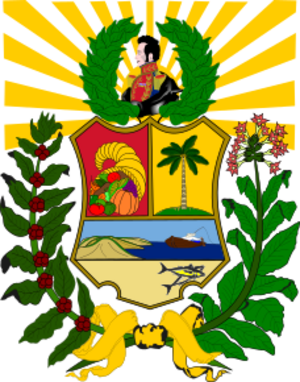Sucre (state) facts for kids
Sucre is one of the 23 states in Venezuela. Its capital city is Cumaná. This state is located in the northeastern part of Venezuela, right on the Caribbean coast. It's known for its beautiful beaches, historical places, and rich natural resources.
Contents
Where is Sucre State?
Sucre State is in the eastern part of Venezuela. It borders the Caribbean Sea to the north, which means it has a long coastline with many beaches. To the south, it shares borders with the states of Anzoátegui and Monagas. To the east, it meets the Gulf of Paria and the Atlantic Ocean. This location makes Sucre an important area for fishing and trade.
Geography and Nature
Sucre State has a mix of different landscapes. You can find mountains, plains, and coastal areas.
Mountains and Plains
The northern part of the state is home to the eastern part of the Cordillera de la Costa mountain range. This area has hills and valleys. Further south, the land becomes flatter, with plains that are good for farming.
Rivers and Coasts
Several rivers flow through Sucre, like the Manzanares River, which runs through Cumaná. The coastline is very diverse, with sandy beaches, rocky cliffs, and calm bays. The Paria Peninsula is a notable feature, stretching out into the Caribbean Sea.
Mochima National Park
A big part of Sucre's natural beauty is found in Mochima National Park. This park is shared with Anzoátegui state. It protects a stunning area of islands, coves, beaches, and marine life. It's a popular spot for snorkeling, diving, and enjoying nature.
History of Sucre State
Sucre State has a very old history, especially its capital, Cumaná.
Cumaná: A Historic City
Cumaná was founded in 1515 by Spanish explorers. This makes it one of the very first European cities established on the South American mainland. Because of its age, Cumaná has many old buildings and forts that tell stories of the past.
Early Settlements
Before the Spanish arrived, indigenous people lived in this area. They were skilled fishers and farmers. When the Europeans came, they built forts like the Castillo San Antonio de la Eminencia to protect the city from pirates and other invaders.
Independence Hero
The state is named after Antonio José de Sucre. He was a very important general who fought alongside Simón Bolívar for Venezuela's independence from Spain. Sucre was known for his bravery and leadership. He is one of Venezuela's national heroes.
People and Culture
The people of Sucre State are known for their friendly nature and rich cultural traditions.
Music and Dance
Music is a big part of life in Sucre. Traditional music often includes instruments like the cuatro (a small Venezuelan guitar) and maracas. Dances like the Joropo are popular, especially during festivals.
Festivals and Traditions
Many festivals are celebrated throughout the year. These often involve colorful parades, traditional music, and delicious food. Religious festivals are also very important to the local communities.
Delicious Food
Sucre's food is influenced by its coastal location. Seafood is a main ingredient. You can find dishes like fresh fish, shrimp, and octopus. Other popular foods include empanadas (fried pastries with fillings) and arepas (cornmeal patties). Tropical fruits like mangoes and coconuts are also abundant.
Economy and Resources
The economy of Sucre State relies on several key activities.
Fishing and Agriculture
Fishing is a major industry because of the state's long coastline. Many people work as fishermen, catching various types of fish and shellfish. Agriculture is also important, with crops like cocoa, coffee, and sugarcane grown in different parts of the state.
Tourism
With its beautiful beaches, national parks, and historical sites, tourism is growing in Sucre. Visitors come to enjoy the sun, sea, and learn about the state's history. Places like Mochima National Park and the beaches of Araya are popular destinations.
Other Industries
Besides fishing and farming, Sucre also has some industries related to salt production, especially in the Araya Peninsula, which has large salt flats.
Images for kids
-
Antonio José de Sucre, Grand Marshal of Ayacucho, one of Venezuela's national heroes
-
Beach of Cumaná
See also
 In Spanish: Estado Sucre para niños
In Spanish: Estado Sucre para niños



























